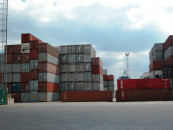Analysis: Why everybody hates the proposed petroleum policy
Oil companies complain about red tape, provinces about regulatory and royalty rights.

The government’s proposed Petroleum Exploration and Production Policy 2012, it seems, is not getting any love from anywhere.
The provincial governments hate it because it gives most of the regulatory powers (and the attendant revenues) to the federal government. The oil companies hate it because it effectively places an artificial cap on the price their can receive and does not automatically grant development rights to the company that finds oil or gas in any given sector. And when the National Assembly finds out that the policy allows the government to give foreign state-owned companies control over large swathes of Pakistan’s oil and gas fields through no-bid contracts, they will probably hate it too.
Provinces: ‘We want the money’
For the moment, all the attention seems focused on the provinces’ objections to the proposal. The provincial governments have decided to take up the issue in the Council of Common Interests, a body that includes representatives from the federal and provincial governments.
The provinces’ stance seems to be that, after the 18th Amendment to the constitution, oil and gas fall under provincial jurisdictions and hence the regulatory powers and royalty revenues should go to provincial governments. Senior officials in the Punjab government told The Express Tribune that the federal government wants the matter to be resolved outside the CCI, where the provinces can outvote Islamabad.
It is unclear when the matter will be taken up by the CCI, but it will likely not end well for the federal petroleum ministry if the policy goes there.
Oil companies: ‘This changes nothing’
Perhaps the single biggest complaint of the oil companies is that the policy does little to reduce the bureaucratic red tape that most companies need to go through before they can begin their exploration policies.
“This policy shows no promise of quick and effective expedition of ministerial approvals and removal of the frustrating red tape which every foreign company faces at its entry into Pakistan,” wrote Barrister Aemen Zulfiqar Maluka, CEO of Josh and Mak, an Islamabad-based law firm that advises oil companies, in a blog that appeared on the website Opinion Maker.
The policy concentrates considerable power into the hands of the Directorate General of Petroleum Concessions, but, compared to the 2001 policy, does not appear to limit the number of procedures that a company must go through to get a licence.
Crucially from the perspective of oil companies, there does not seem to be an automatic transfer of a licence from an oil exploration to a development licence, a practise that is standard throughout developed oil markets around the world. For instance, if a company spends $40 million drilling exploratory holes (the average cost of one hole in Pakistan), they would expect to be given the right to extract the oil or gas if they find any.
Given that it takes digging an average of three holes to find one deposit, a company can expect to spend upwards of $100 million before it finds anything. Yet the government of Pakistan is not willing to then automatically give the right to extract the oil or gas to the company that paid to find it.
This is why the oil and gas companies do not want the matter to be regulated by the provincial governments, since they are far more susceptible than the federal government to populist hysterics that drive away investors who have put in the money to find natural resources.
Politicians: ‘You’re giving what away?’
Yet what is likely to be the most controversial aspect of the proposal from the perspective of politicians in Parliament is the fact that it gives the DGPC the right to designate any foreign state-owned oil company – Saudi Arabia’s Aramco, for example, or China’s Sinopec – a ‘strategic partner’ and grant them exploration and development rights without any competitive bidding process.
If there was outcry at the thought of Gulf Arab companies buying up agricultural land in Pakistan, imagine the popular resistance to the idea of foreign government-owned oil companies being given away oil fields without any transparent bidding.
If this bill is actually read in the National Assembly or the Senate, it is highly unlikely to pass. But who knows? It would not be the first time that Parliament has passed a bill without bothering to read it.
With additional reporting by Qaiser Butt in Islamabad
Published in The Express Tribune, January 11th, 2012.


















COMMENTS
Comments are moderated and generally will be posted if they are on-topic and not abusive.
For more information, please see our Comments FAQ